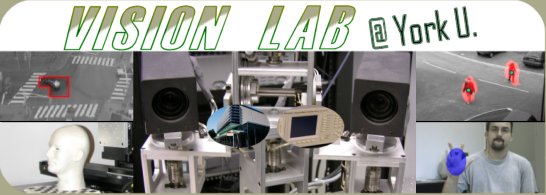Spatiotemporal stereo datasets
Mikhail Sizintsev and
Richard P. Wildes
Contact email sizints at cse dot yorku dot ca
Department of Computer Science and Engineering
and Centre for Vision Research
York University, Toronto, ON, Canada
Overview
This website provides datasets for stereo video processing.
This database will be updated periodically through introduction of additional challenging datasets with non-lambertian
scenes, thin structures, camoflaging texture, transparencies and translucencies.
For details of our technical approach to spatiotemporal stereo, see our project page.
Datasets with ground truth
The following datasets were captured in our lab with a Bumblebee [PointGrey] stereo camera.
We used the uncalibrated structured light method of [Scharstein/Szeliski03] to capture a high quality
ground truth for each of the frames separately.
Lab 1

(Download)
The camera is moving toward the scene while part of the scene moves up.
The scene is composed of various weak epipolar-aligned texture patches,
camouflage effect (foreground and background planes are of very similar texture),
and complex 3D boundary outline with highly non-lambertian surfaces (gargoyle in the right).
Lab 2

(Download)
The camera is moving toward the scene while gargoyle and two planar weakly-textured planes undergo
out-of-plane rotations. The scene possess hight slants, complex 3D boundaries and significant non-trivial depth motion.
Lab 3

(Download)
The camera is moving toward the scene two textured bars are rotated and translated.
The scene is equipped with ARTag markers [Fiala'05] which are used to deduced stereo
and 3D motion ground truth.
Datasets without ground truth
We also present more complex dataset without ground truth as it is taken
under uncontrolled conditions and/or outside of the lab environment.
Office

(Download)
Camera translating toward the left, person enters the scene and performs various activities.
Sequence possess quite large unconstraint motion as well as spatial and temporal aliasing artifacts.
Video results of the current approach
Video results reported by the [Sizintsev/Wildes] approach on the datasets can be dowloaded below
Lab 1 sequence disparity results
Lab 2 sequence disparity results
Lab 1 sequence motion results
Lab 2 sequence motion results
Lab 3 sequence motion results
Office sequence disparity results
Rover sequence disparity results
Related Papers
- PointGrey Resarch Inc. BumbleBee stereo camera.
- D. Scharstein and R. Szeliski, Hight-accuracy stereo depth maps using structured light.
in Proceedings of the Conference on Computer Vision and Pattern Recognition (CVPR), pages 195-202, 2003. pdf
- M. Sizintsev and R. P. Wildes, Spatiotemporal stereo via spatiotemporal quadric element (stequel) matching
York University Technical Report, CSE-2008-04, 2008.
(pdf version)
- M. Sizintsev and R. P. Wildes, Spatiotemporal stereo via spatiotemporal quadric element (stequel) matching, In proceedings of the IEEE Conference on Computer Vision and Pattern Recognition, 2009. (pdf version)
Last updated: October 15, 2010.
| 


